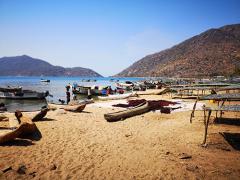Global Study on Small-Scale Fisheries to Provide Vital Knowledge, Recognizes U.N. Food Report

The Illuminating Hidden Harvests study will provide critical knowledge and information on small-scale fisheries globally, informing the way forward for sustainable development of the sector.
This vital contribution of the study, due out in late 2020, was acknowledged in the United Nations Special Rapporteur on the Right to Food report released on January 25, 2019.
The study will make headway toward identifying "the specific needs of small-scale inland and capture fisheries," which are often overlooked in policy. The diverse and dispersed nature of small-scale fisheries makes it hard to quantify their contributions, which in turn reinforces their hidden (unreported) and marginalized position in policy at national, regional, and global scales.
Illuminating Hidden Harvests (IHH) is a collaborative study between Duke University's Nicholas Institute for Environmental Policy Solutions and Nicholas School of the Environment, the Food and Agriculture Organization of the U.N. (FAO), and WorldFish. The study will assess the diverse contributions and drivers of change of small-scale fisheries globally, encompassing harvest and post-harvest activities.
Through a greater understanding of small-scale fisheries, the U.N. report says IHH will "promote policies and programmes that enable them to build resilience in the face of dual challenges from globalization and climate change." This is critical to ensuring that small-scale fisheries—which employ 90 percent of fishers worldwide, most of them in developing countries—are developed in a productive, sustainable, and equitable way.
The IHH study was recognized in paragraph 75 of the U.N. report, which looked at how fish workers contribute to the food and nutrition security of others and the barriers they face in accessing food themselves. This follows on from recognition of IHH in The State of World Fisheries and Aquaculture 2018 report, the biannual flagship publication of the FAO Fisheries and Aquaculture Department.
"Such mentions highlight the demand for the information that the study aims to produce, as small-scale fisheries are increasingly recognized as an activity where poverty, food security and fisheries policies strongly intersect. This is both a challenge and an enormous opportunity for policymakers," said Dr. Xavier Basurto, Associate Professor, Nicholas School of the Environment, and a member of the IHH core team.
The IHH study is expected to be "the most extensive compilation to date of the available information on the diverse contributions of small-scale fisheries to communities and countries around the world," says the U.N. report. This will help to fill critical knowledge gaps on small-scale fisheries, particularly around their economic, environmental, social, and governance contributions.
Coastal fish stocks are being depleted due to industrial fishing, marine pollution and climate change, the U.N. food report highlights. These pressures often have negative impacts, such as forcing "small-scale fishing communities further from shore, often without adequate equipment."
The IHH study will help to highlight such drivers of change for national marine and inland small-scale fisheries and, in turn, provide policy-relevant understandings. Critically, this will support implementation of the Voluntary Guidelines for Securing Sustainable Small-Scale Fisheries and efforts to achieve the sustainable development goals.



